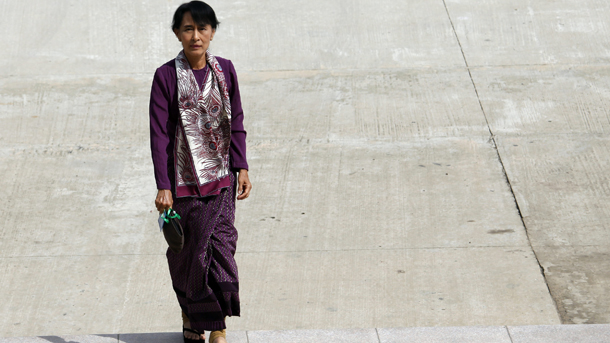RANGOON — Burma’s Parliament agreed Wednesday to set up a commission to review the pro-military 2008 constitution, a process that could eventually change the political landscape and allow opposition leader Aung San Suu Kyi to contest the presidency.
Suu Kyi’s opposition National League for Democracy (NLD) party has long said that the constitution is undemocratic because of provisions that allow the military to control a substantial percentage of parliamentary seats and disqualify Suu Kyi from holding the presidency.
However, lawmakers from the ruling Union Solidarity and Development Party (USDP), who proposed the commission, say they want to change provisions concerning state governments to allow ethnic minorities increased self-rule.
Lawmakers said the two houses of parliament agreed unanimously Wednesday to look at the charter and consider whether to implement changes.
The commission’s first task will be to determine whether the constitution should be amended. The constitution was essentially dictated by the former military government, in which current President Thein Sein served as prime minister, and the USDP was set up largely to serve the military’s interests.
“It is natural that any law, however perfect it may be, will need to be adjusted according to changes over time, when it is found to be inappropriate for internal and international political, social and economic conditions,” lower house Speaker Shwe Mann said last week. “It is the duty of the lawmakers to make modifications in line with the time and circumstances.”
Shwe Mann, who served in the former ruling junta, is a rival of Thein Sein and is seen as vying for leadership of the USDP.
Even if the stated goal of a constitutional review is not to benefit Suu Kyi and her party, the process sends a signal that the ruling party is flexible and perhaps willing to make some sort of deal with her before the 2015 general election.
Sandar Min, a lawmaker from Suu Kyi’s party, called the committee’s establishment “a positive step.”
Asked what her party would like to see amended, Sandar Min said there are many undemocratic articles in the constitution that need to be changed. She did not elaborate.
Another lawmaker from Suu Kyi’s party, Phyo Min Thein, suggested earlier this week that reviewing the constitution was a gesture meant to reward Suu Kyi for her moderate position in a dispute over a copper mine.
Suu Kyi headed a committee that recommended that operations at the Letpadaung copper mine in northwestern Burma be allowed to continue to honor a joint venture contract with neighboring China and reassure potential foreign investors.
Residents near the mine had mounted strong protests against it, and said they were greatly disappointed that Suu Kyi failed to support their demands that the mine stop operating because of environmental damage. Suu Kyi’s position badly dented her image as an idealist above the political fray.
One provision in the constitution that might be changed is the president’s prerogative to appoint state-level chief ministers. Many border areas dominated by ethnic minorities would like to elect their own.
Conflict with ethnic minorities seeking greater autonomy has bedeviled democratic and military governments alike since Burma obtained independence from Britain in 1948, and has often involved armed rebellions. Thein Sein’s government is seeking to establish cease-fires and eventually political accords with all of them.
Aye Mauk, a USDP lawmaker, said a constitution review committee would deal with chapters regarding ethnic minorities, and that other political issues would likely also be considered.
“Some modifications of the constitution have to be made after peace talks with ethnic groups and issues regarding autonomy in state and region levels will be considered during the review process,” he said.
Since coming to office in 2011, Thein Sein has instituted a series of political and economic reforms after almost five decades of repressive army rule. A major achievement was persuading Suu Kyi’s party to rejoin the electoral process, and the NLD won 43 of 44 seats it contested in by-elections last year.















